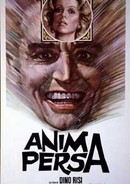
ANIMA PERSA
Italy, 1977, 100 minutes, Colour.
Vittorio Gassman, Catherine Deneuve, Anicee Alvina.
Directed by Dino Risi.
Anima Persa is excellent Italian film-making. Ostensibly a Gothic horror story (who is the madman locked in the attic?), it portrays ancient families in decay in a symbolic crumbling Venetian setting. Into it comes a young man, hopeful but bewildered by the family secrets. An allegory of contemporary Italy? Probably. Visual detail is superb, atmosphere of moulding mystery and the contrast of the seventies very well sustained, especially in the character of the artist's Model who attracts the hero. The leads are Vittorio Gassman and Catherine Deneuve, both excellent, Gassman giving, a variation of the role he played in the same director's excellent and not dissimilar 'Scent of the Woman'.
1. The significance of the title, The Lost Soul, its reference to Fabio, to Italy? Realistic significance, symbolic?
2. The importance of the colour photography and the locations? Venice, the Palazzo, the art school? The interiors and exteriors? Venice and its buildings as the exterior of the soul? The atmosphere. the music?
3. The choice of Venice for the location as symbol? The credits? The old lady and bad breath? Venice as a dying city, decaying? Italy and its decay? The old Italian aristocracy and its decay? Fabio representing this?
4. The audience being invited to enter this world with Tino? The experience of Venice and the people with Tino., leaving with him? Agreeing with his choices? The identification with Tino and the audience seeing everything from his point of view: puzzle, learning, curiosity, understanding? The quality of the experience undergone by Tino?
5. The background of age and youth and its contrast? Appearances and reality? The paradoxes of sanity and madness? Building and decay? A world of secrets, the background of old world and empire? Italy and all these paradoxes?
6. Tino as a personality. attractive. young? His background, age and wealth? His work as an art student? His capacity for learning? His relationships? His fears and coping? The effect of this experience on his life?
7. Tino and his entering the Palazzo, the experience of the rooms, the puzzle? The conventions yet his not being exploited, yet the ugliness of the situation?
8. The introduction of Elisa, an attractive woman, in herself, her age, illness? A pleasant person, a nice manner? Her secrets? The importance of the humiliations, her going out? The wine? The presentation of Fabio as a saint and the consequences of this? Nevertheless her fear, seeming stupidity? The details and background of the story of Beba?
9. The impact of Fabio, his appearance, age, culture, Austria, his family, his style and his demands? His attitude towards youth? His spartan and strict attitudes? Tino's puzzle about him, attraction? The audience sharing this?
10. The contrast with the uncle, viewing him secretly, the hideous aspects of his behaviour, the opposite of Fabio? The importance of the presence of the whore?
11. Anneta, ordinary yet secrets. the revelation of these, the jokes?
12. The contrast with Lucia and the art class, the visits, friendship, the sharing of secrets? The emphasis and the freshness from a different world?
13. The background of art, the film's presentation of theories of art, drawing and how these were applied to the plot and the treatment of themes?
14. The point of view of Fabio, the presentation of his philosophy of life, audience interest in it? response, questions? Tino and his trying to understand this?
15. The importance of the Beba stories? In themselves, relevance to the characters, the truth?
16. Cemetery sequences, the books? The element of mystery?
17. The birthday after the gas search, its significance, dramatic impact?
18. The film's detailed characterisation of Fabio both as a person and his ideas, motivation ? the indications of another side, was this final revelation expected?
19. The significance of the truth? Was Fabio the saw as his alter ego or not? The background of Holderlin and schizophrenia? The two sides of the one personality ? the saved soul and the lost soul?
20. Elisa and Beba and the truth? The facing of the truth and its effect on Tino? The two endings of the film and audience response?
21. A portrait of madness and society? The effect of madness on those loved? On those who are puzzled and have to cope? The background of Italy and its two personalities? Italian society and values?